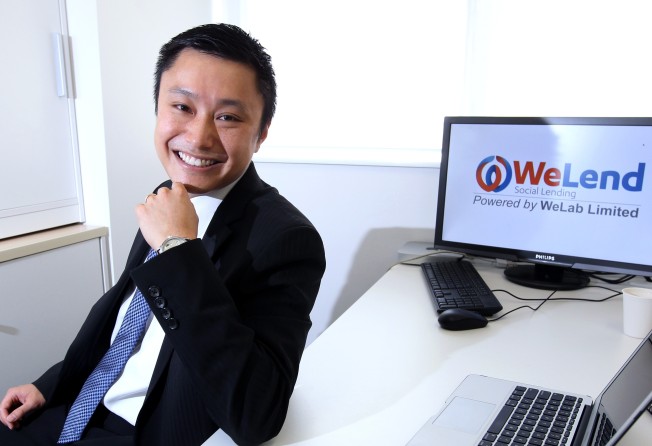Higher rates for addresses in caps – online lender WeLend reveals how it determines your creditworthiness
Proprietary big data and AI tech helps company whittle down delinquency rates

If you are looking to take out a loan from online lending platform WeLend to buy the iPhone X, be warned – should you use only upper-case letters when filling out the address field in your application, you could be charged a higher interest rate.
“We actually match how people fill out addresses with the probability of [them] declaring bankruptcy after a certain number of years,” said Simon Loong, the founder and chief executive of WeLab, the Hong Kong company that operates WeLend.
“The probability of [an applicant] declaring bankruptcy is highest when they fill in their address in capital letters,” he said. “We think this could relate to one’s education level. Every interaction we have with a user gives us insight into their choices, background, and this … helps us better understand individuals.”
WeLab gathers hundreds and thousands of data points about its 25 million users in Hong Kong and China, crunching the numbers to determine the creditworthiness of each user using its proprietary big data and artificial intelligence technology.
In Hong Kong, the company relies primarily on a user’s credit history and interaction data. In mainland China, where less than 30 per cent of the population has a credit score, WeLab relies much more on unstructured, mobile data.
This means the company collects a wider variety of information from its users, such as the phone model they use, installed apps, social networks and even how much time they spend talking on the phone.
Yet another observation WeLab has made is that delinquency rates tend to correlate with loan application times – if a user applies for a loan between 1am and 6am, they are more likely to default on a payment than users who apply in the day, Loong said.
Thanks to the massive amount of data the company has, WeLab can make loans to customers without ever meeting them face to face, while whittling down the loan delinquency rate to just more than 2 per cent on the mainland, and under 1 per cent in Hong Kong.
The shortest amount of time WeLab has taken to approve a loan was just 1.7 seconds after the application was submitted, Loong said on Thursday.
It is WeLab’s startling accuracy in predicting user creditworthiness and its popularity in Hong Kong and China that has led the company to raise US$220 million in series B+ funding and debt financing this week, after landing US$160 million in its series B round last year. The company declined to comment on its current valuation or whether it had plans for an initial public offering.
With its fresh funds, Loong told the South China Morning Post that it is looking to expand into new markets in Southeast Asia next year, these potentially including Indonesia, Thailand, the Philippines and Vietnam.
“The technology we have that helps people to apply for loans seamlessly on mobiles is even more relevant for developing markets, where there are many people who are unbanked,” Loong said. “For what we do, a young population and high mobile penetration [represent a bigger and more effective market].”
He said countries like Indonesia, where the average age of a person is about 28 years, has characteristics that mirror the Chinese market – such as a very mobile-savvy population that owns an average of 1.4 mobile devices per person.
Apart from making loans to consumers, WeLab also licenses its technology to banks on the mainland and in Hong Kong to help them better assess risk. Traditionally, banks look at a user’s credit history and assets to determine if a loan can be given, but WeLab’s technology helps to make this decision process more effective.